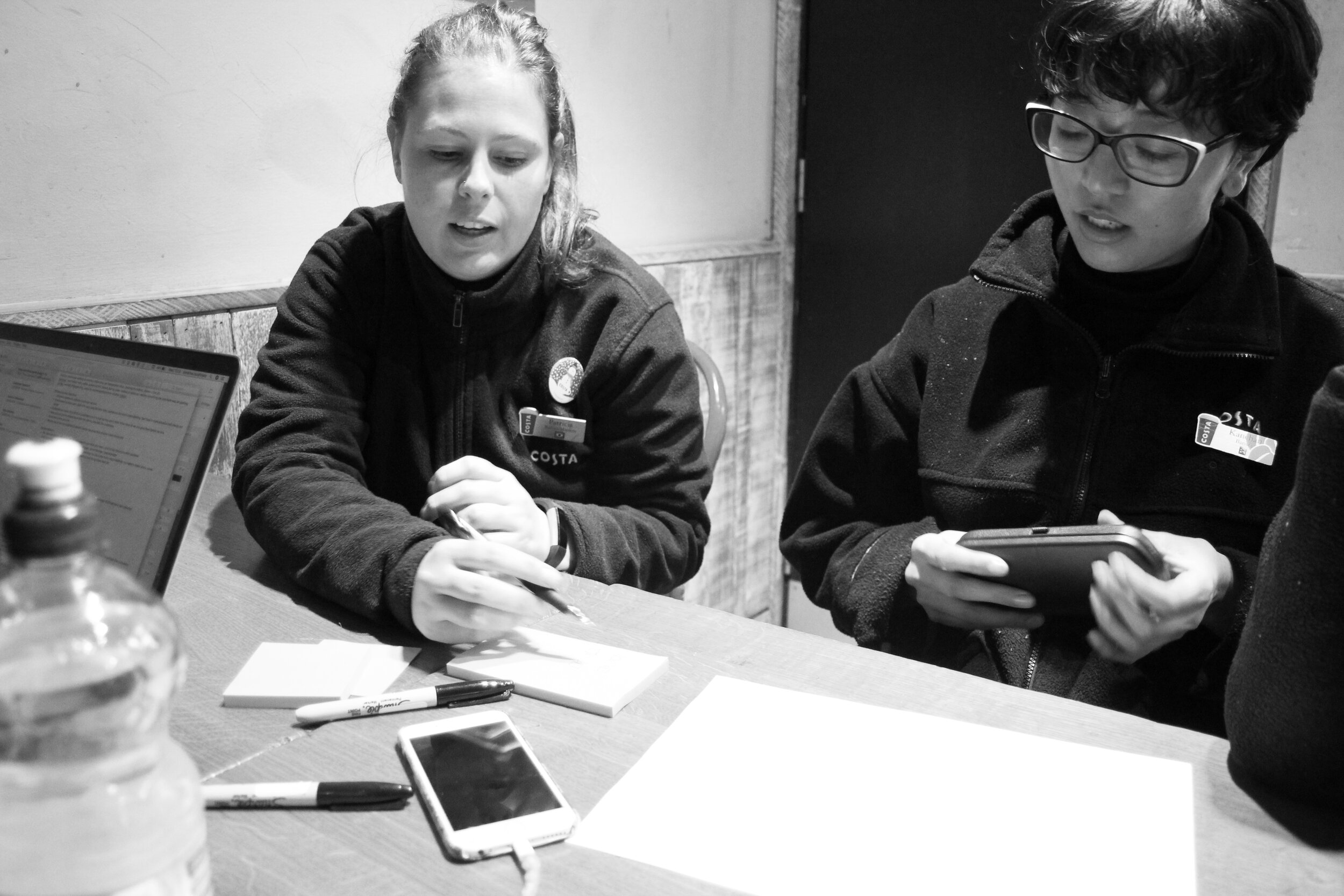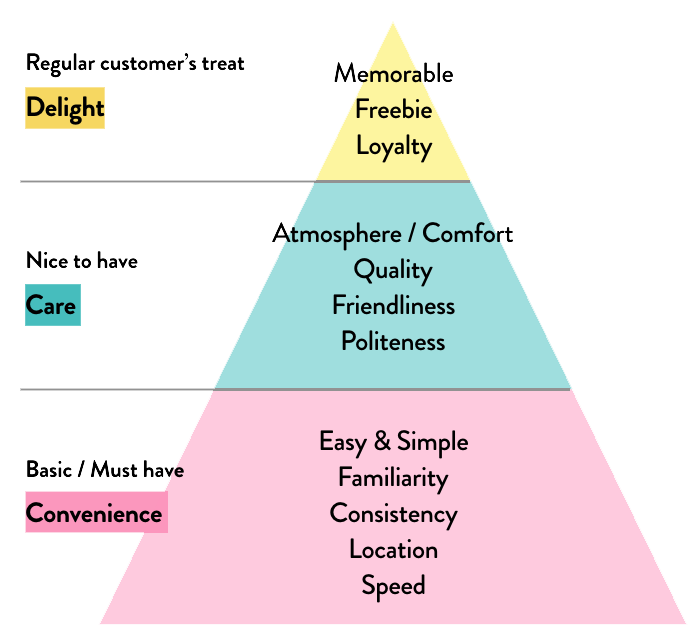Client
Costa Coffee
Agency
Method Inc.
Team
Ana Soto
Helen LeVoi
Yumiko Tanaka
Sandrine Herbert
Thomas Wagner
Chris Macdonald
Expertise & Skills
Service Design
Design Research
Rapid prototyping
Co-creation workshops
User validation sessions
Duration
5 weeks
Location
London
Opportunity
The multinational coffee brand owned by The Coca Cola company, Costa Coffee identified the need to improve their on-the-go offer for morning commuters - the Costa Mini store. Their traditional store formats made it hard for them to tap into the urban commuter’s on-the-go needs.
Solution
We took a human-centred, and lean design sprint approach to create the best possible in-store experience for a new Mini-format store designed to deliver high quality coffee in an experience that feels fast without being forced. Over the course of five weekly design sprints, we rapidly developed and prototyped concepts that enabled Costa’s new Mini venture to further stand out in a market that is already optimised for speed.
Understanding the current space using various research methods
During the immersion week we set out to understand current Costa services, the competitive landscape, and the morning commuters’ core needs. We conducted diverse research activities to understand the space and set up the foundation for the design sprints.
These research activities included store visits, guerrilla testing, and interviewing current barista employees to gather insights on operations and customer interactions.
Store visits
We visited eight Costa shops around London during morning rush hours to experience the customer journey ourselves. We were able to observe store operations and customer behaviour first hand to better grasp the current issues and opportunities.
Establishing design parameters to guide design sprints
Design parameters form the basis upon which all design decisions are made.
They are a set of key ingredients that frame the parameters within which the design process occurs, and serve to ensure that all proposed solutions arising from the design process are desirable for the end consumer, viable for the business, and operationally feasible.
These design parameters included:
Understanding the existing persona
Establishing a value proposition to differentiate Costa Mini
Developing business goals
Understanding the life of the London commuter
We worked with Costa’s existing persona ‘Alex’ as our target customer. Alex is a full-time white collar worker who lives on the edge of London and has to commute everyday through busy hours. We conducted guerrilla interviews in busy London train stations during morning rush hour to gain knowledge on commuters’ lives and validate essential experience needs.
Experience factors
These first round of interviews generated insights that enabled us to understand what the building blocks of a good experience for the commuter are:
Convenience factors - the basic/must have elements
Care factors - the nice to have differentiators
Delight factors - are special treats for regular customers that engender a sense of loyalty and reward.
We found that there is a big difference between operational speed and the customer’s perception of speed. Focusing solely on operational speed does not produce the best possible customer experience and can compromise customer engagement.
With this in mind we set out to design an experience that focused on delivering the perception of speed, creating a truly convenient and delightful experience.
Lean sprint approach to rapidly develop and validate concepts
After establishing the foundation we started with the concept phase of the design sprints. Every sprint started with a workshop. After sharing learnings from the previous sprint, we generated ideas for the new customer experience, whilst also addressing the feasibility and viability of concepts.
An aligned team
The Costa team was highly engaged in the design process. During each sprint, the relevant stakeholders participated in the co-design workshops to review the previous sprint learnings followed by a collaborative ideation sessions. This process ensured alignment across the whole team and allowed us to move faster.
Validating concepts with users in a space prototype
Following the workshop, we refined hypotheses and prepared a structured user test with the participants representing the target audience. We rapidly tested ideas with in-depth interviews, prototyping, observations and roleplaying.
This accelerated the process of research, building, testing, and learning allowing us to connect with real customers to more accurately gauge desirability of the recommendations to achieve the fastest perceived coffee buying experience.
Building a space prototype
We created two space mock-ups of the new store proposition, enabling us to test hypotheses in full context, addressing the interplay of both physical and digital touchpoints and the impact of human traffic. At the same time, experiencing the service in low fidelity helped the Costa stakeholders empathise earlier with their customers’ needs, rather than just thinking operationally.
Illustrating a new service concept and its delivery processes
By combining our research findings and Costa’s ambitions, we defined the ideal workflow for Costa Mini to deliver the fastest perceived way to order coffee on a morning commute.
We used Customer Journeys and a Service Blueprint to provide evidence to support the experience definition whilst outlining the business and operational requirements needed to deliver the service successfully.
Furthermore, these tools allow us to take a holistic view of all the actions needed to deliver a complete and unified customer experience.
Alex’s journey
We divided the recommendations by the four key stages of Alex’s journey (Queuing, ordering, waiting, receiving), which allowed us to consider key service moments with added focus. When considered together, however, they weave a cohesive narrative of the ideal service model.
Framing actionable recommendations for service delivery
We identified recommendations founded on key findings from in-field research and in-person customer validation sessions. They are framed through the Costa brand lens and ambition to deliver the fastest perceived coffee buying experience.
The recommendations were intended to be specific and actionable. Most are implementable today, and some suggested future opportunities for digital enhancement of the customer experience.
Cherishing the hand over moment
We identified a key differentiating opportunity to add a moment of delight to the customer experience: the hand over moment.
As speed of service is so optimised, it’s the moments that stand out that are remembered and add value. For the busy London commuter, getting a coffee in the morning is must to start the day right. Coffee energises them, and in some instances this is the first human contact they have in the day. This is why it is crucial for this encounter to be fast, efficient, but most importantly, human.
Our research showed that handing customers their coffee with a smile and eye contact whilst repeating the order adds a critical element of human interaction that shows care and differentiates the brand from other chain coffee shops, whilst also ensuring that the customer is confident they received the beverage they ordered. We also found that a pleasant interaction at the very end of an experience can reduce any bad feelings should someone have waited longer than they anticipated for their beverage.
Our recommendations have been implemented across various Costa Mini’s worldwide:
Costa Mini – London
Costa Mini – Shanghai
Project Impact
01
Collaborated with Costa Coffee stakeholders and introduced them to design processes to rapidly explore, develop, and validate service concepts.
02
Developed a service model for the fastest perceived way of getting a Costa coffee and set the foundation for the Costa Mini proposition.
03
Equipped Costa with a holistic and human-centred way of thinking that cut across various siloed work-streams.


























